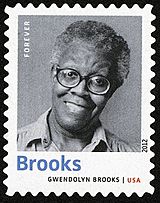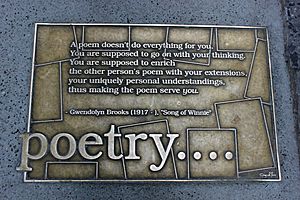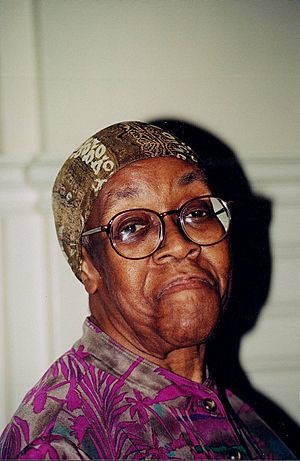Gwendolyn Brooks facts for kids
Quick facts for kids
Gwendolyn Brooks
|
|
|---|---|

Commemorative postage stamp of Gwendolyn Brooks issued by the USPS in 2012.
|
|
| Born | Gwendolyn Elizabeth Brooks June 7, 1917 Topeka, Kansas, U.S. |
| Died | December 3, 2000 (aged 83) Chicago, Illinois, U.S. |
| Occupation | Poet |
| Period | 1930–2020 |
| Notable works | A Street in Bronzeville, Annie Allen, Winnie |
| Notable awards | Pulitzer Prize for Poetry (1950) Robert Frost Medal (1989) National Medal of Arts (1995) |
| Spouse |
Henry Lowington Blakely, Jr.
(m. 1939; died 1996) |
| Children | 2, including Nora Brooks Blakely |
Gwendolyn Elizabeth Brooks (June 7, 1917 – December 3, 2000) was an American poet, author, and teacher. Her poems often explored the joys and challenges of everyday people in her community. On May 1, 1950, she won the Pulitzer Prize for Poetry for her book Annie Allen. This made her the first African American to ever receive a Pulitzer Prize.
Brooks earned many more awards throughout her writing career. She lived in Chicago her whole life. In 1968, she became the Poet Laureate of Illinois, a role she held for 32 years. She was also named the U.S. Poet Laureate for 1985–86. In 1976, she was the first African American woman to join the American Academy of Arts and Letters.
Contents
Early Life and Education
Gwendolyn Elizabeth Brooks was born on June 7, 1917, in Topeka, Kansas. She grew up on the South Side of Chicago. Her parents were David Anderson Brooks and Keziah (Wims) Brooks. Her father worked as a janitor. Her mother was a school teacher and a trained concert pianist.
When Gwendolyn was six weeks old, her family moved to Chicago. This move happened during the Great Migration. Chicago became her lifelong home. She always felt a strong connection to the city.
She started school at Forestville Elementary on Chicago's South Side. She then attended different high schools: Hyde Park High School, Wendell Phillips High School, and Englewood High School. At these schools, she faced racial unfairness. This helped her understand prejudice in society.
Brooks started writing at a young age. Her mother encouraged her, saying she would be like the famous poet Paul Laurence Dunbar. When she was 13, her first poem was published in American Childhood. By the time she finished high school in 1935, she was writing regularly for The Chicago Defender newspaper.
After high school, Brooks attended Wilson Junior College for two years. She decided not to get a four-year college degree. She knew she wanted to be a writer and felt it was not needed. She graduated in 1936 and worked as a typist while pursuing her writing dreams.
Gwendolyn Brooks's Career
Brooks published her first poem, "Eventide," at age 13. By 16, she had written about 75 poems. At 17, she began sending her work to "Lights and Shadows," a poetry column in The Chicago Defender. Her early poems used different styles, from traditional ballads to free verse with blues rhythms. Famous poets like James Weldon Johnson and Langston Hughes praised her work.
Her poems often featured characters from the inner city life she knew. She once said, "I lived in a small second-floor apartment... There was my material."
In 1941, Brooks joined poetry workshops. One important workshop was led by Inez Cunningham Stark. Here, Brooks found her unique voice and learned more about writing techniques. Langston Hughes visited the workshop and heard her read a poem. In 1944, two of her poems were published in Poetry magazine.
First Books and Awards
Brooks's first poetry book, A Street in Bronzeville (1945), was published by Harper & Brothers. It told stories about an African American girl growing up in Chicago. The book was highly praised for its realistic look at life in Bronzeville. A positive review by Paul Engle in the Chicago Tribune helped her become well-known. In 1946, she received her first Guggenheim Fellowship.
Her second poetry book, Annie Allen (1949), focused on a young Black girl becoming a woman in Chicago's Bronzeville. This book won the 1950 Pulitzer Prize for poetry. It also received Poetry magazine's Eunice Tietjens Prize.
In 1953, Brooks published her only storybook, a novella called Maud Martha. This book has 34 short chapters about a black woman's journey into adulthood. It explores themes of self-doubt and how she fits into the world. Maud faces prejudice from both white and lighter-skinned black people. The book shows how Maud eventually stands up for herself.
Later Works and Influence
In 1967, Brooks attended the Second Black Writers' Conference. There, she met activists and artists who introduced her to new ideas about black culture. This experience inspired much of her later writing. She even taught creative writing to members of a Chicago gang called the Blackstone Rangers.
In 1968, she published In the Mecca. This long poem is about a mother searching for her lost child in a Chicago apartment building. The poem was nominated for the National Book Award.
Brooks also wrote two autobiographies: Report From Part One (1972) and Report From Part Two (1995). Her other works include Primer for Blacks (1980) and Winnie (1988).
Teaching and Archives
Brooks's first teaching job was at the University of Chicago. She taught a course in American literature. This started her lifelong dedication to teaching poetry and writing. She taught at many universities across the country.
Her writings and papers are kept in special collections. The Rare Book & Manuscript Library at the University of Illinois has her archives. The Bancroft Library at UC Berkeley also has a collection of her personal papers.
Family Life
In 1939, Gwendolyn Brooks married Henry Lowington Blakely, Jr. They met through the Chicago NAACP Youth Council. They had two children: Henry Lowington Blakely III and Nora Brooks Blakely. Henry Lowington Blakely, Jr. passed away in 1996.
Brooks enjoyed helping young black poets. She mentored her son's fiancée, Kathleen Hardiman, in writing poetry. This led her to mentor more young writers.
Gwendolyn Brooks died at her Chicago home on December 3, 2000. She was 83 years old. She is buried in Lincoln Cemetery.
Honors and Legacy
Honors
Gwendolyn Brooks received many awards and honors throughout her life:
- 1946: Guggenheim Fellow in Poetry.
- 1949: Poetry magazine's Eunice Tietjens Memorial Prize.
- 1950: Pulitzer Prize in Poetry for Annie Allen. She was the first African American to win this award.
- 1968: Appointed Poet Laureate of Illinois.
- 1976: Inducted into the American Academy of Arts and Letters.
- 1985: Selected as the U.S. Poet Laureate of the United States.
- 1988: Inducted into the National Women's Hall of Fame.
- 1989: Awarded the Robert Frost Medal for her lifetime achievements in poetry.
- 1995: Presented with the National Medal of Arts.
- 1997: Awarded the Order of Lincoln, Illinois's highest honor.
Legacy
Brooks's legacy lives on through many places and events named in her honor:
- 1970: Gwendolyn Brooks Cultural Center at Western Illinois University.
- 1990: Gwendolyn Brooks Center for Black Literature and Creative Writing at Chicago State University.
- 2001: Gwendolyn Brooks College Preparatory Academy in Chicago.
- 2003: Gwendolyn Brooks Illinois State Library in Springfield, Illinois.
- 2004: Hyacinth Park in Chicago was renamed Gwendolyn Brooks Park.
- 2012: Honored on a United States' postage stamp.
- 2017: Various events celebrated what would have been her 100th birthday.
- 2018: A statue of her, "Gwendolyn Brooks: The Oracle of Bronzeville," was unveiled in Gwendolyn Brooks Park.
Works
Here are some of Gwendolyn Brooks's notable works:
- A Street in Bronzeville, 1945.
- Annie Allen, 1949.
- Maud Martha, 1953.
- Bronzeville Boys and Girls, 1956.
- The Bean Eaters, 1960.
- In the Mecca, 1968.
- Report from Part One: An Autobiography, 1972.
- Winnie, 1988.
- Report from Part Two, 1996.
See also
 In Spanish: Gwendolyn Brooks para niños
In Spanish: Gwendolyn Brooks para niños
- African American literature
- Chicago Literature
- Golden shovel, a poetic form inspired by Brooks' work
- List of African American firsts
- List of poets
- List of Poets from the United States
 | Aaron Henry |
 | T. R. M. Howard |
 | Jesse Jackson |



